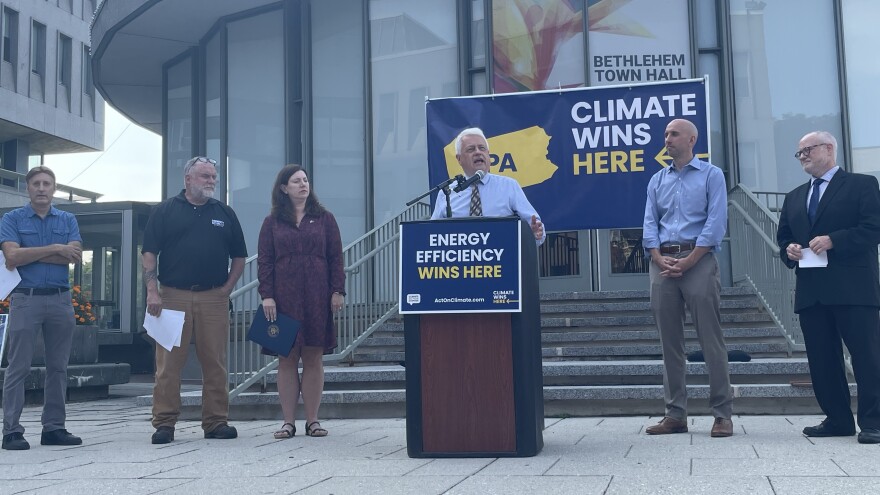- Funding through the Inflation Reduction Act and the Bipartisan Infrastructure Law will bolster efforts nationwide in addressing the climate crisis, officials say
- One legislator says he'll co-sponsor a bill with a goal of 100% statewide renewable energy by 2050
- An environmental justice implementation group is part of Bethlehem's Climate Action Plan
BETHLEHEM, Pa. — As more severe weather makes its way to the Lehigh Valley, state and local leadership shared more on Thursday as to what’s next for dealing with climate change.
Bethlehem Mayor J. William Reynolds said city officials in 2017 launched the initial planning stage of the Climate Action Plan, amid a lack of direction from the federal level on the topic.
A local look
The Bethlehem Health Bureau has been working on the All Hazards Public Preparedness Plan examining the local impact of wildfires, he added.
Addressing the mitigation and adaptation of the city during extreme weather events while also protecting frontline communities has been a multi-level process, he said. An environmental justice group is also part of the Climate Action Plan.
“We know that as the climate action and climate change occurs more and more into the future that our frontline communities, our most vulnerable populations, those that were most affected by the pandemic, are going to bear the brunt of the effects of climate change."Bethlehem Mayor J. William Reynolds
“We know that as the climate action and climate change occurs more and more into the future our frontline communities, our most vulnerable populations, those that were most affected by the pandemic, are going to bear the brunt of the effects of climate change,” Reynolds said.
Reynolds added that he’s thankful for the federal government’s response to these issues — including the implementation of funding through the Inflation Reduction Act and the Bipartisan Infrastructure Law — as it would be tough for the city to handle it all on its own.
“Here in the Lehigh Valley, we have seen increased precipitation, we have seen increased flooding,” Reynolds said. “We have had to spend more and more of our local tax dollars on infrastructure, on changing our systems and planning for all of those impacts that we are seeing in the short term.”
Megan Beste, district director for Congresswoman Susan Wild of Pa.’s 7th District, spoke on how the previously mentioned funding would affect normal, everyday people.
“I wanted to talk about what those important investments look like for a family like mine: consumer home energy rebate programs to help low-income families electrify appliances and save money, consumer tax credits to make homes more energy efficient and help families save money, making things like heat pumps, electric HVAC, water heaters, and more, affordable,” Beste said.
This would also include funding for bolstering weatherization assistance programs and the Low Income Home Energy Assistance Program, she said.
“We have directly witnessed the energy and cost savings to participants in our weatherization program and energy efficient rehab program, often resulting in up to $100 a month in financial savings from early results, while lowering the energy load of local utilities, advancements in HVAC, water heaters, insulation techniques and green roofs not only benefit the low-income individuals but the entire community."Chuck Weiss, Community Action Lehigh Valley associate executive director
Chuck Weiss, associate executive director for Community Action Lehigh Valley — an anti-poverty nonprofit — said his group has seen firsthand what weatherization improvements can do for families.
“We have directly witnessed the energy and cost savings to participants in our weatherization program and energy efficient rehab program, often resulting in up to $100 a month in financial savings from early results, while lowering the energy load of local utilities, advancements in HVAC, water heaters, insulation techniques, and green roofs not only benefit the low-income individuals but the entire community,” Weiss said.
A broader look
Benjamin Felzer, Lehigh University associate professor within its Department of Earth and Environmental Sciences as well as vice chair of the city’s Environmental Advisory Council, said the Northeast region of the country has experienced a number of notable weather scenarios here recently, including hazardous air quality from wildfires in eastern Canada, heat waves and many examples of flooding.
“The recent extreme weather events we’ve witnessed throughout the U.S. are clearly being exacerbated by human-induced climate change,” Felzer said. “The warmer world we are creating is leading to a more enhanced hydrological cycle and warmer ocean temperatures, resulting in more intense hurricanes, more heavy rainfall events, as well as increased drought and wildfires and continental interiors.”
“We must improve the infrastructure in vulnerable minority communities that are already at a disadvantage when it comes to coping with the impacts of climate change."Benjamin Felzer, Lehigh University associate professor within its Department of Earth and Environmental Sciences
He said the extreme heat this summer forced him to stay indoors more than he would’ve liked, but not everyone has the luxury of air conditioning. He said collaboration to help those less fortunate would require collaboration among governments, companies, universities, and beyond.
“We must improve the infrastructure in vulnerable minority communities that are already at a disadvantage when it comes to coping with the impacts of climate change,” he said.
Felzer added he personally invested in solar panels this summer with help from tax credits as part of the Inflation Reduction Act.
'Winning big'
Jeff Garis, outreach and partnerships director with the Pennsylvania Policy Center — a nonpartisan public policy research and advocacy organization — said folks in the Lehigh Valley are “winning big” when it comes to weatherization efforts and energy efficiency as a result of these federal investments.
“In addition to creating jobs and accelerating our transition to a clean-energy economy, these investments will help homeowners and business leaders use less energy and lower their energy costs."Jeff Garis, Pennsylvania Policy Center outreach and partnerships director
“In addition to creating jobs and accelerating our transition to a clean-energy economy, these investments will help homeowners and business leaders use less energy and lower their energy costs,” Garis said.
He said the funds put into these changes and more would help slash climate pollution in half by 2030.
Statewide efforts
State Rep. Steve Samuelson, D-Northampton County, said $369 billion out of the Inflation Reduction Act would be used to address energy security and climate change.
He said one component of that money would be used to allow some federal funding for solar energy at schools.
“This would provide grants from the state to make sure more and more schools, school districts, community colleges, career and technical schools can apply for that federal funding,” Samuelson said.
He added that the motion has been approved in the House with a bipartisan vote of 134-69, including favorable votes from all Democrats and 1/3 of Republicans, and is now in the Senate for potential approval.
“This would provide grants from the state to make sure more and more schools, school districts, community colleges, career and technical schools can apply for that federal funding."State Rep. Steve Samuelson D-Northampton County
Samuelson mentioned that five of 22 schools in the Bethlehem Area School District feature solar panels to aid in operation, with two elementary schools being completely off grid.
From there, he said a renewable energy bill in which he’ll co-sponsor could see a vote soon, with the goal of reaching 100% renewable energy statewide by 2050.
Another piece of legislation he mentioned that's currently before the House Consumer Affairs Committee includes an appliance energy efficiency and water conservation standards bill, as sponsored by 165th District of Delaware County Rep. Jennifer O’Mara.
In a letter on the PA House website, O’Mara and others wrote that setting minimum efficiency standards for 16 household and commercial appliances through this legislation would cut air pollution statewide by 224,000 metric tons annually while also reducing other emissions.
If approved, they wrote that those actions could save up to $108 million for residents in 2025 and quadruple that amount come 2035.


